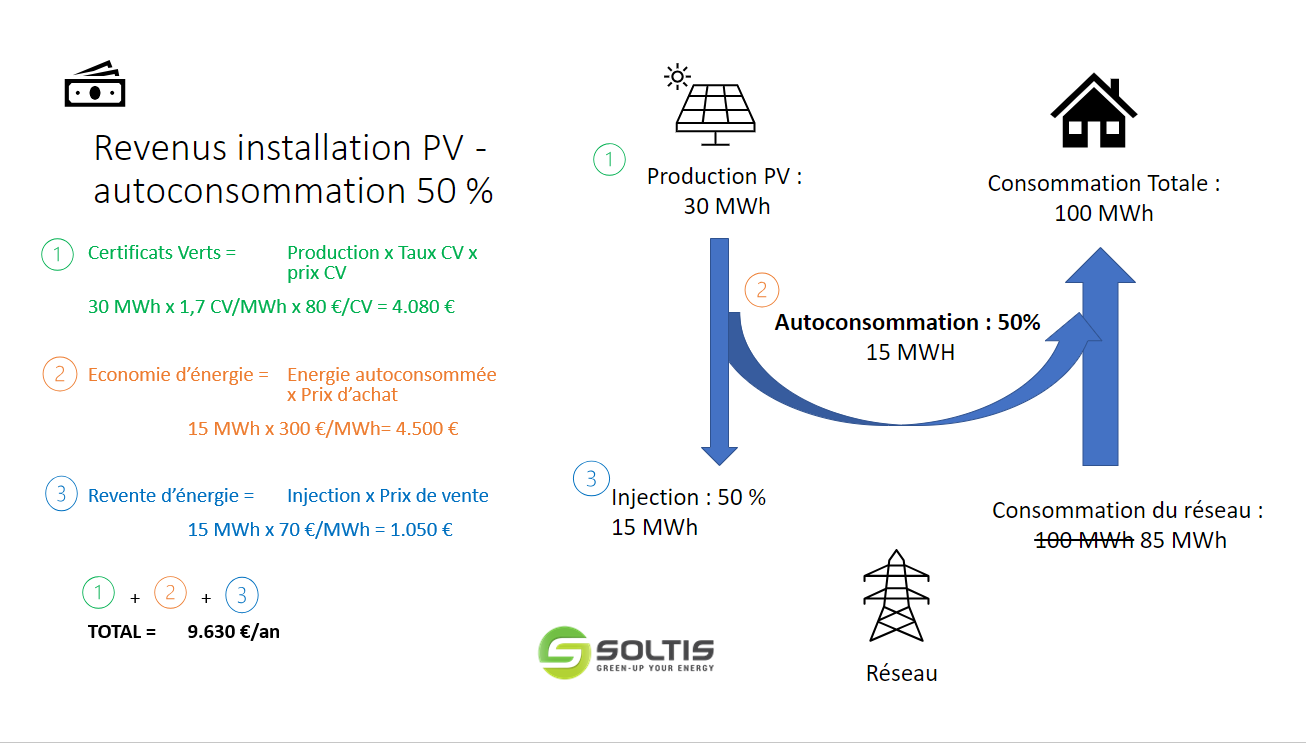This article explores the different ways in which photovoltaic installations can help you save money while contributing to Belgium's energy transition.
To illustrate our explanation, we'll start with the concrete case of a Brussels company consuming 100 MWh/year (100,000 kWh/year), and which has a photovoltaic system producing 30 MWh/year. This represents around 75 solar panels of 430 Watts-peak (Wp: power under standard conditions) 32,250 Wp of installed power.
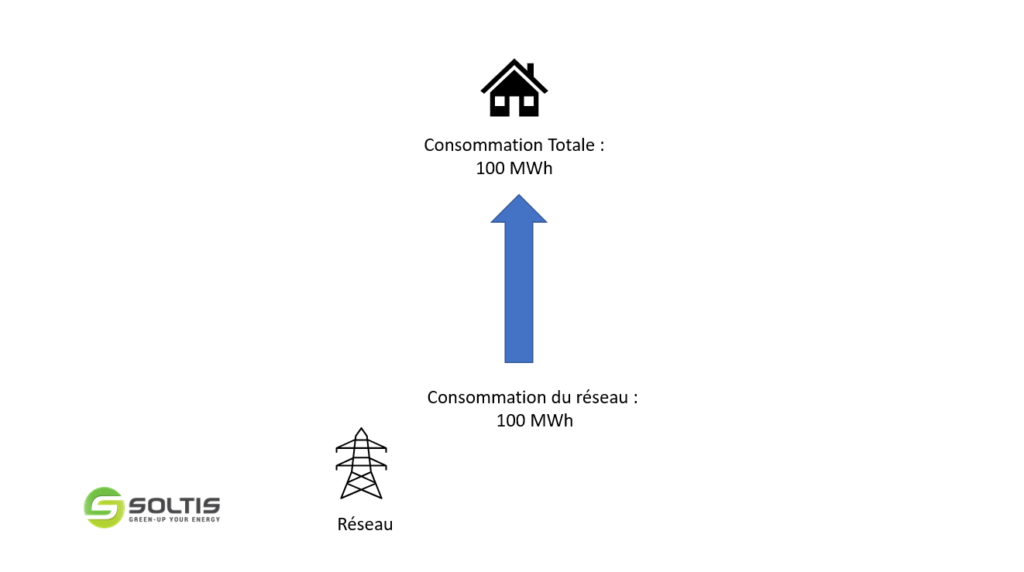
1. Income from Green Certificates :
In Brussels, owners of solar panels can benefit from the green certificate system. Green certificates are granted for 10 years. The number of certificates awarded is proportional to the amount of energy produced.based on the grant rate in effect at the time of installation.
In 2023, the green certificate allocation rate in the Brussels-Capital Region is around 1.7 green certificates for each MWh or thousand kilowatt-hours (kWh) produced. The green certificates can then be resold at a price defined by the market. Today, the estimated selling price is around 80 euros per green certificate (consult prices in real time on the government website).
The income generated by these green certificates is added to the savings (see points 2 and 3 below) on the electricity bill.
In our example :
Income from Green Certificates (CVs) = (in euros)
30 MWh (production) x 1.7 CV (grant rate) x €80 (price per CV) = €4,080/year, for 10 years.
This gives an approximate 10-year income of 40,000 euros. Important: the CV grant rate is fixed and guaranteed for 10 years from commissioning of the plant. The price of CVs varies according to the market price.
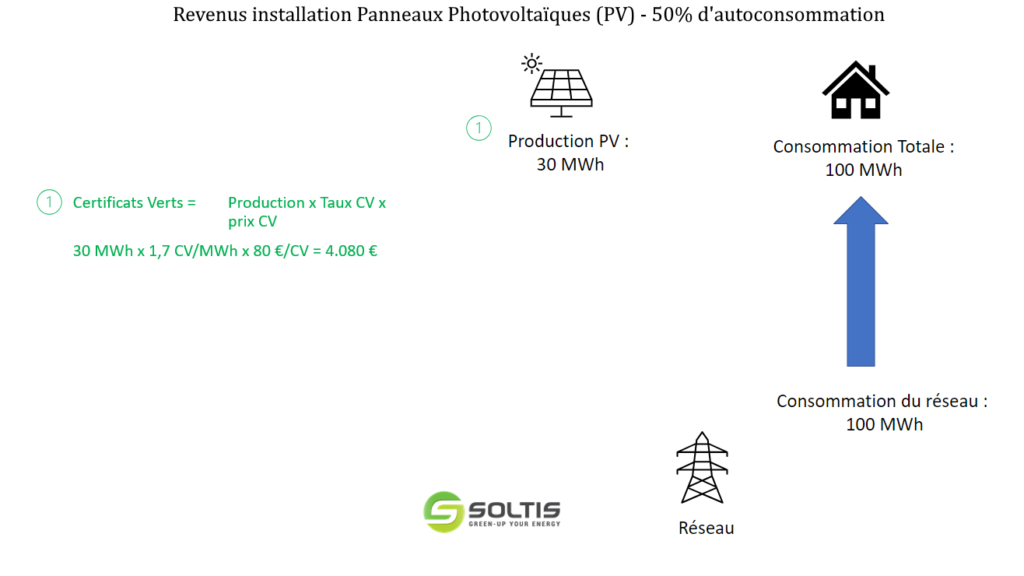
See also our article on this subject: PHOTOVOLTAIC SUPPORT MECHANISMS: HOW THEY WORK BY REGION
2. Energy savings through self-consumption :
With solar panels, part of the energy produced is consumed directly on site, reducing your dependence on the electricity grid. On average for a household in Belgium, it is estimated that between 30% and 40% of the energy produced is self-consumed. This means you'll buy less electricity from the grid, generating savings on your annual electricity bill.
For a company, the rate of self-consumption depends very much on the company's profile. This must be carefully analyzed to estimate the profitability of an installation (call in one of our experts free of charge). For our example, we have assumed a self-consumption rate of 50%.
In our example :
With 50% self-consumption, of the 30 MWh of electricity produced, 15 MWh will be consumed directly by the company. For our calculation, the electricity purchase price considered is €300/MWh (or €0.30/kWh).
Energy saving =
30 MWh (production) x 50% (self-consumption) x €300 (purchase price/MWh) = €4,500/year.
Over 10 years, the saving is €45,000, without taking into account the rise in energy prices (3%/year on average).
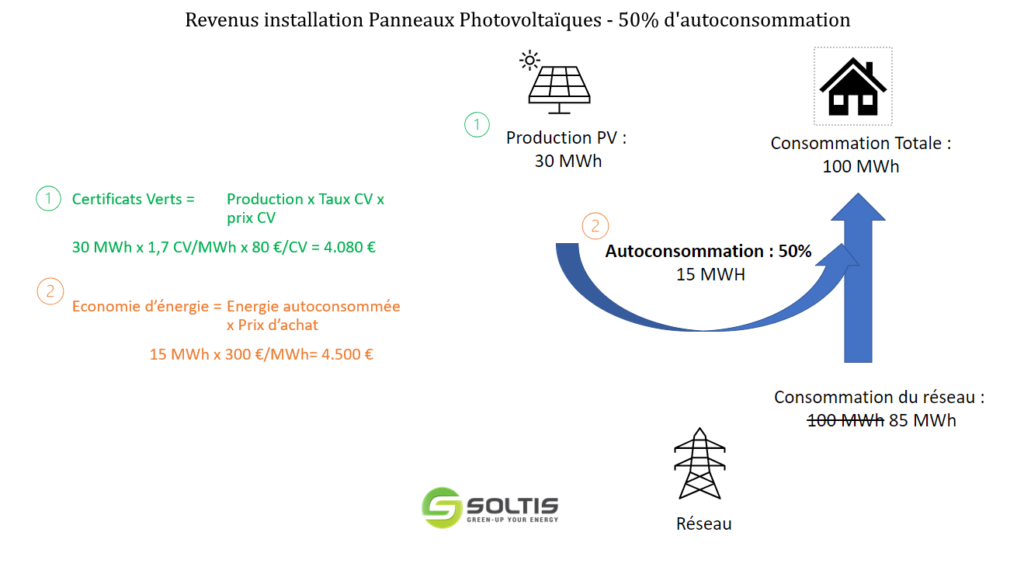
3. Resale of surplus energy :
When your solar panels produce more energy than you consume, the surplus is fed into the grid. This surplus energy can be sold, generating additional income. The selling price is lower than the purchase price, because the latter does not include network and other costs that are included in the purchase from your supplier. Depending on the quantity of energy resold and the feed-in tariff in force, this source of income can make a significant contribution to your savings.
In our example :
With a self-consumption rate of 50%, the injection rate is 50%. Half of the 30 MWh produced will be resold, i.e. 15 MWh. We have considered an average resale price of €70/MWh (or €0.70/kWh) from your electricity supplier.(Engie, Total Energies, Luminus, . ..).
Electricity resale =
30 MWh (production) x 50% (injection) x €70 (resale price/MWh) = €1,050/year.
Over 10 years, the income generated by the resale of electricity amounts to around €10,000, without taking into account the increase in energy prices (3%/year on average).
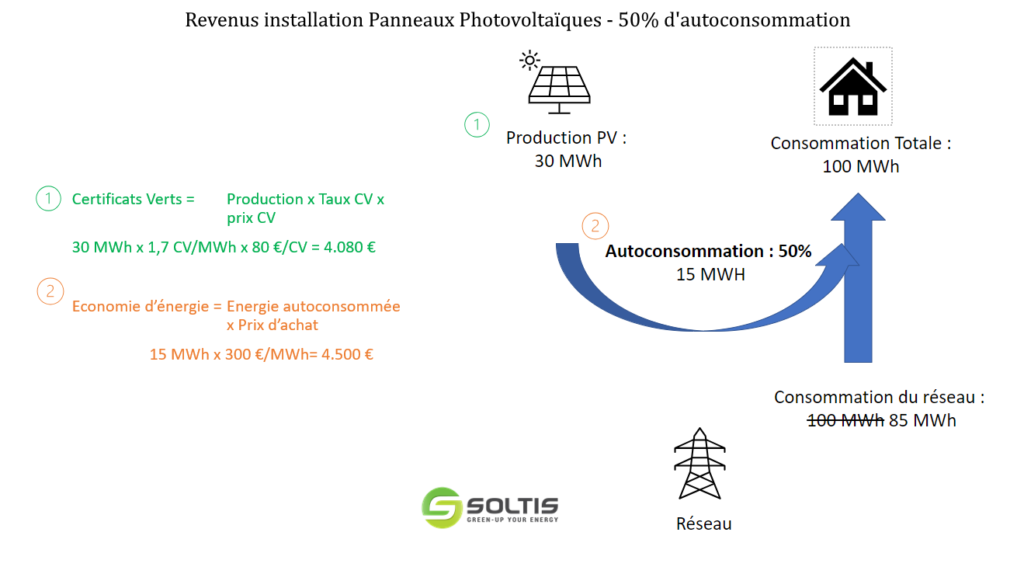
As you can see, the higher the self-consumption rate, the greater the savings. It is therefore strongly recommended that you adapt your consumption so that you consume as much of your own energy as possible, rather than selling it back to your supplier.. Of course, the most effective way to reduce bills is to try to reduce consumption.
To illustrate the impact of self-consumption on the profitability of a photovoltaic installation, we carried out the same exercise with a self-consumption rate of 70%.
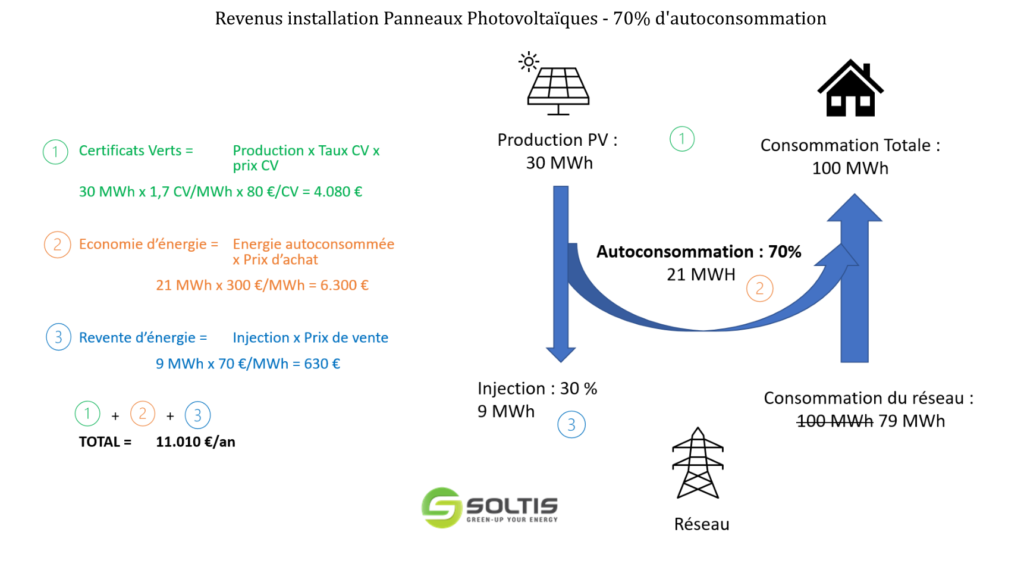
With a self-consumption rate of 70%, energy savings rise from €4,500 to €6,300/year, while sales increase from €1,050 to €630/year. The gain is €1,380/year compared with 50% self-consumption.
In short, the more you use your own energy, the more you save and the more you earn.
Comparison of financial benefits by region :
Given that an installation of 75 430-Watt peak (Wp) panels costs around €35,000 (indicative price, to be refined according to the project!), it will pay for itself in between 3 and 6 years, depending on the region and self-consumption.
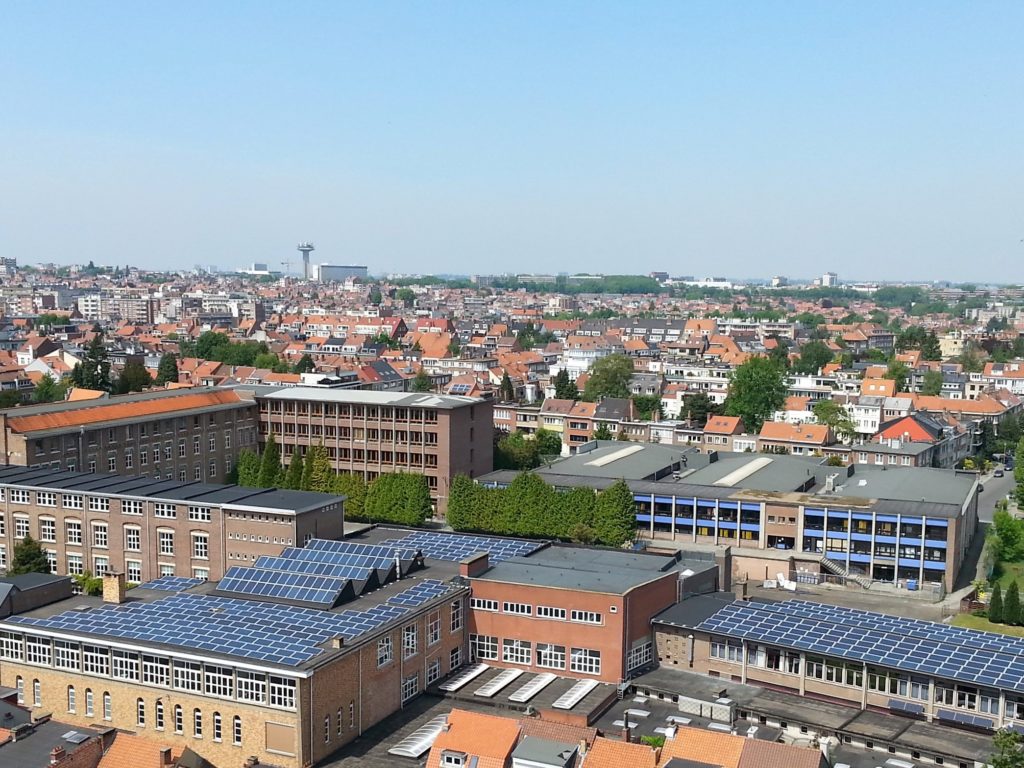
Financial benefits vary by region in 2023.
For the situation with 50% self-consumption :
- In Brussels, where the green certificate system is still in place, annual savings can reach €9,600/year with the 2023 grant rate. The system pays for itself in just under 4 years, regardless of rising energy prices. With a self-consumption rate of 70%, profitability is achieved in just 3 years.
- In Flanders and Wallonia, where there are no more green certificates, savings can amount to €5,500 a year. The installation pays for itself in just over 6 years. This is without taking into account the rise in energy prices. With a self-consumption rate of 70%, profitability is achieved in just 5 years.
Conclusion:
Installing solar panels in Belgium offers an attractive return on investment in terms of energy and cost savings. Even without green certificates, owners of photovoltaic systems can recoup their investment in just a few years. To further optimize their financial savings, here are three key ways:
- Reduce energy consumption: Insulating the building, replacing essential equipment with more efficient equipment, replacing lighting with LEDs, or eliminating unnecessary consumption.
- Self-consumption : By directly using the solar energy produced by the panels, homeowners can reduce their dependence on electricity suppliers and thus lower their monthly (annual) electricity bills. Especially when the company uses energy-hungry machines during the day.
- Sale of surplus electricity : If your photovoltaic system produces more energy than you need, you can sell the surplus to an electricity supplier. This generates additional income and optimizes savings.
- Green certificates available in Brussels.
- (Bonus) Lifespan of solar panels: Solar panels are designed to last for several decades, typically between 25 and 30 years. By optimizing maintenance and keeping them running smoothly, homeowners can maximize savings over the lifetime of the panels.
In addition to the financial benefits, using solar energy helps to protect the environment and combat climate change, by reducing greenhouse gas emissions.
Installing solar panels in Belgium is a cost-effective, environmentally-friendly solution for homeowners who want to save money while promoting energy sustainability.
.
If you'd like to find out more about our offers for installation or to determine whether your future solar panels will be profitable, don't hesitate to ask us for a quote.

